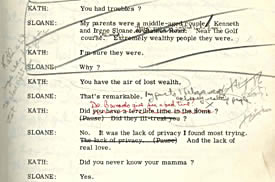Orton
had completed his first major script, Entertaining Mr
Sloane, and acquired an agent, Peggy Ramsey, a formidable
and well respected figure in the theatre.
Ramsey saw promise in the play but also its flaws. At
their first meeting she was hard on him but he took the
criticism well and promised to write a better play for
her next time. Referring to Sloane as ‘our play’
he asked if ‘his friend’ could come to the
next meeting. Halliwell attended almost all meetings with
Ramsey from then on. It was also Ramsey’s suggestion
that
Orton change his name from John to Joe, ‘John Orton’
sounded too much like ‘John Osborne’, a leading
playwright at the time.
The Sloane script was picked up almost immediately much
to Ramsey’s surprise. At this time all theatre scripts
had to be approved by the Lord Chamberlain’s Office
for standards of decency. To Orton’s great amusement
when the play was returned all the heterosexual references
had been cut and all the homosexual ones left in.
The play caused quite a stir when it opened and there
were mixed responses. The Daily Telegraph commented ‘Not
for such a long time have I disliked a play so much as
I disliked Joe Orton’s …’
The playwright Terence Rattigan wrote to Orton ‘I
don’t think you’ve written a masterpiece ...
but I do think you’ve written the most exciting
and stimulating first play that I’ve seen in 30
odd years of play going.’
Rattigan not only praised Orton’s work he also put
up £3,000 to move Sloane to the Wyndham Theatre
in the West End. This time the Telegraph review was slightly
more supportive, ‘while shameless and
repulsive ...
I sat through it last night a second time ... and was
held throughout. ‘
That year Sloane was voted joint winner for Best New British
Pay in Variety’s London Critics Poll. Orton’s
transformation was now complete. He was a successful,
award winning playwright, with plaudits from his peers
and a play in the West End.
John had become Joe.
